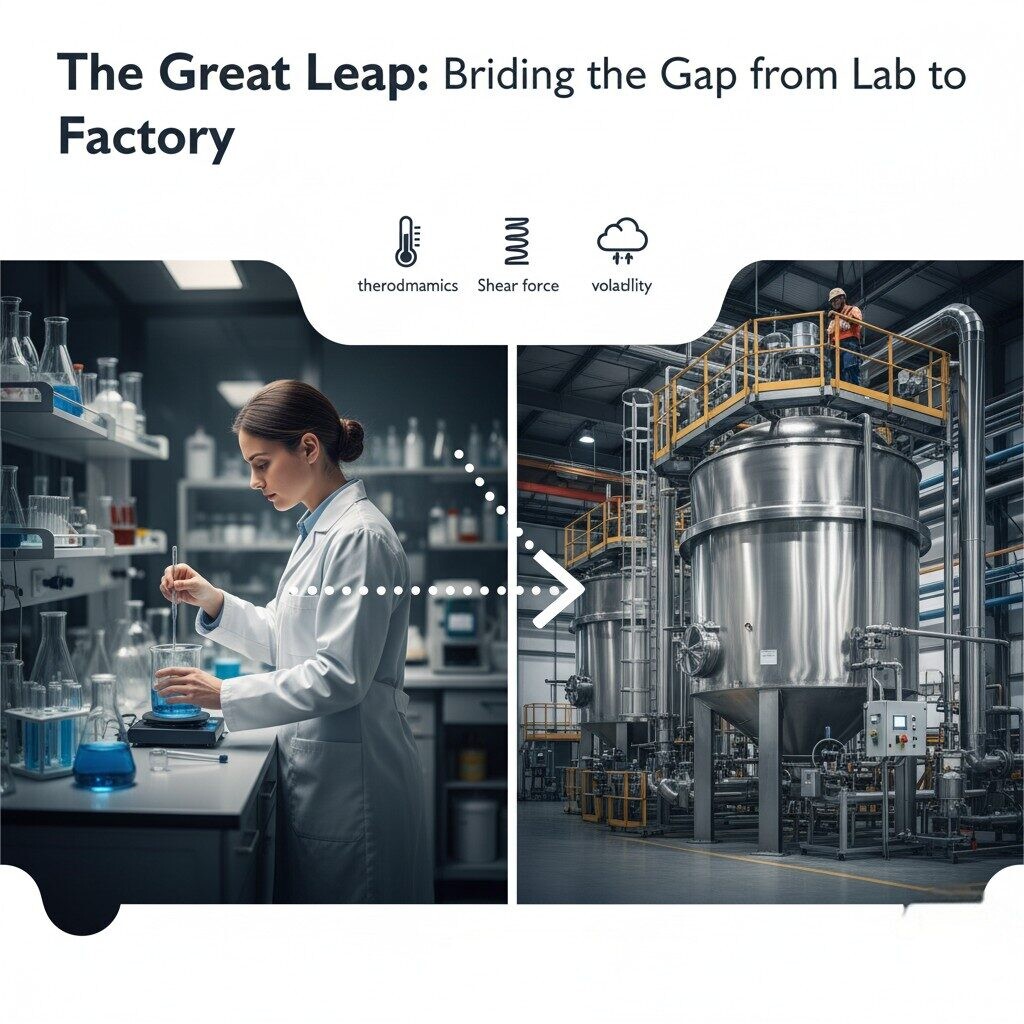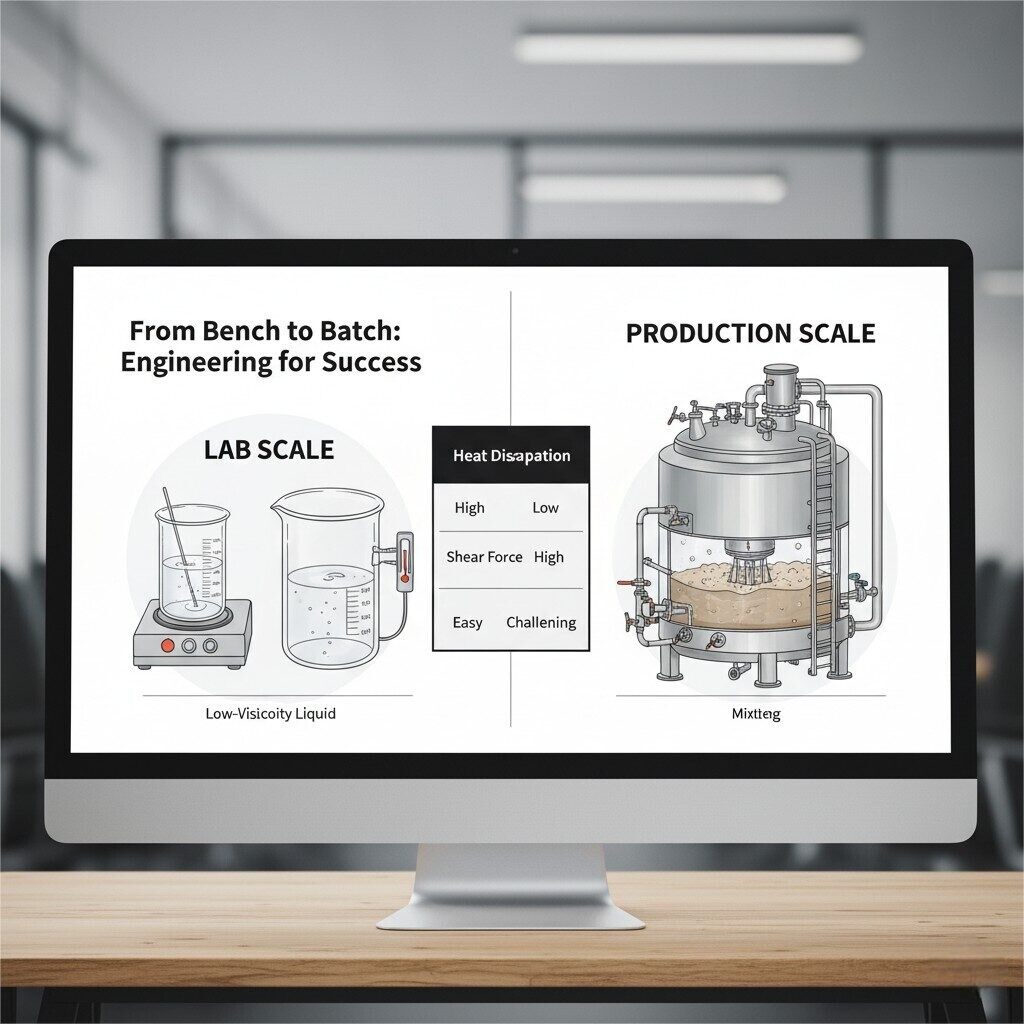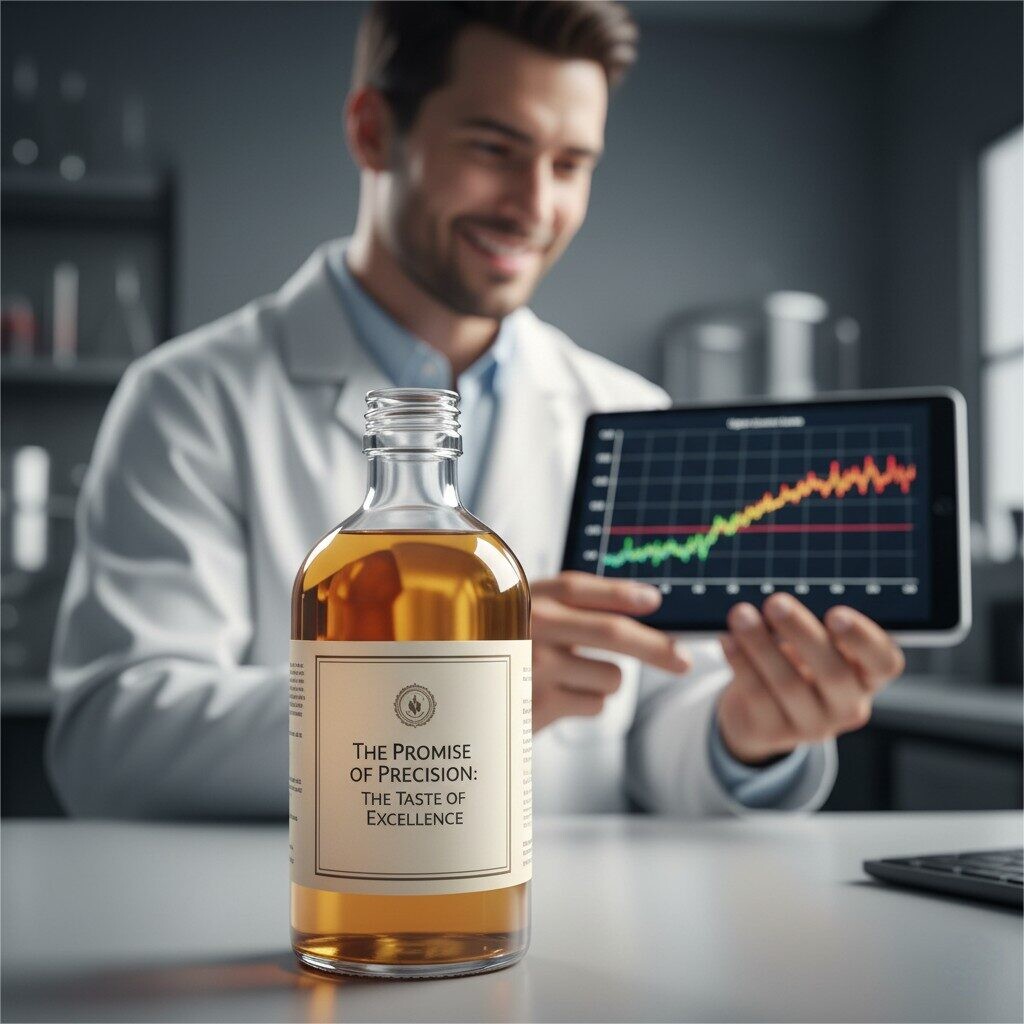
Lab to Factory Transition
The journey of a new flavor begins with a moment of creation in the lab. A flavor chemist, through a blend of artistry and scientific precision, perfects a new formulation—a unique symphony of aromatic compounds that promises to captivate the senses. The flavor is a masterpiece, a “golden sample” that delights in a small, controlled bench-scale batch.
But then comes the true test: scaling up.
The transition from a two-liter lab beaker to a 2,000-liter industrial tank is not a simple linear multiplication. It is a complex, multi-disciplinary challenge fraught with hidden variables and non-linear effects. A perfect formula that works flawlessly in the lab can produce a final product that tastes “off,” “flat,” or subtly different when scaled for mass production. This discrepancy can lead to wasted materials, production delays, and, most importantly, a fundamental loss of brand integrity and consumer trust.
Successfully scaling up a flavor formulation is a sophisticated discipline that demands an integrated approach, combining advanced process engineering, analytical precision, and a deep understanding of the chemical and physical variables that change with volume. This comprehensive technical guide will serve as a definitive blueprint for navigating the complexities of aroma scale-up, providing the knowledge and strategies required to translate bench-scale brilliance into large-scale excellence.
The biggest misconception in scaling is the belief that multiplying ingredient quantities by a factor of 1,000 will produce an identical result. In reality, the physical and chemical properties of a mixture do not change linearly with volume.
In a small lab beaker, the heat generated by the mixing of various components is negligible and can be easily dissipated into the surrounding air. In a large industrial tank, however, this changes dramatically.
A small magnetic stirrer in a lab beaker and a massive turbine impeller in an industrial tank operate on fundamentally different principles.
The surface-area-to-volume ratio changes dramatically with scale. This has a direct impact on volatile aroma compounds.
Even with a perfect process, raw material variability can derail a scale-up.
Successful scaling is not about hope; it is about engineering. It requires a systematic approach that utilizes the right equipment and process controls to mitigate the non-linear challenges.
The choice of mixer is the most critical engineering decision in the scale-up process.
Controlling the temperature of the mixture is paramount to preventing flavor degradation.
Accurate ingredient measurement is a non-negotiable.
A pilot run is a small-scale production run that acts as a bridge between the lab and full-scale production. It is a controlled environment designed to test the scaling process and identify potential issues before they become costly failures.

Bench to Batch Engineering
Even with the most advanced engineering, a successful scale-up cannot be confirmed until the final product has been rigorously tested. This requires a dual-layered approach that combines objective analytical data with a trained sensory panel.
Before scaling, a certified “Golden Sample” of the flavor is created in the lab and used as the ultimate sensory benchmark. Concurrently, a master formula is digitized in a Laboratory Information Management System (LIMS), detailing every ingredient, proportion, and processing parameter.
Analytical instruments provide the objective, data-backed evidence that a scaled-up batch is chemically identical to the Golden Sample.
Analytical data is crucial, but it cannot replace the human palate. The final arbiter of a successful scale-up is a trained sensory panel.
SPC is the science of monitoring and controlling a manufacturing process to ensure it operates within a stable, predictable range. We use SPC to monitor key variables in real-time, such as mixing temperature, time, and ingredient flow rates. This allows us to identify and correct deviations before they lead to a full batch failure.
A strategic approach to scaling is not just about engineering and chemistry; it is about building a foundation of data, documentation, and regulatory compliance.
A LIMS is the central nervous system of a modern flavor manufacturing operation. It allows for the storage and analysis of all data, from initial R&D to every single production batch. This data can be analyzed to:
In a highly regulated industry, meticulous documentation is not optional; it is a requirement. Every single step of the scale-up process, from raw material receipt to final packaging, must be documented. The US Food and Drug Administration (FDA)‘s Current Good Manufacturing Practices (cGMPs) require detailed batch records, a rigorous quality control program, and complete traceability of all ingredients (Reference 3: FDA, cGMPs for Food and Flavor Manufacturing, 2024).
For a brand, a robust, documented scale-up protocol is a key part of the Premarket Tobacco Product Application (PMTA) process. It demonstrates to the FDA that the product is manufactured with a high degree of quality and consistency. A brand that can confidently prove this level of quality stands out as a leader in a market where many products are still manufactured without proper controls. A 2024 Reuters report highlighted that regulatory compliance and quality control are becoming the key differentiators for brands aiming for long-term market leadership (Reference 4: Reuters, 2024, “Quality and Compliance in the Vaping Industry: The New Differentiators”).

Precision & Excellence
The successful scale-up of a flavor formulation is the ultimate proof of a brand’s technical expertise and commitment to quality. It is a journey that moves beyond the simple act of mixing and into the realm of advanced engineering, analytical science, and strategic data management.
By understanding and actively managing the non-linear challenges of scaling, a brand can ensure that its final product is a perfect replica of the initial masterpiece created in the lab. This commitment to consistency not only reduces waste and increases efficiency but also builds a foundation of consumer trust that is invaluable in a competitive market. In the end, mastering the art and science of scaling up is the key to sustainable growth and the promise of a superior product for every single consumer.
Keywords: vape flavor upscaling, large batch aroma control
Author: R&D Team, CUIGUAI Flavoring
Published by: Guangdong Unique Flavor Co., Ltd.
Last Updated: Sep 13, 2025
The business scope includes licensed projects: food additive production. General projects: sales of food additives; manufacturing of daily chemical products; sales of daily chemical products; technical services, technology development, technical consultation, technology exchange, technology transfer, and technology promotion; biological feed research and development; industrial enzyme preparation research and development; cosmetics wholesale; domestic trading agency; sales of sanitary products and disposable medical supplies; retail of kitchenware, sanitary ware and daily sundries; sales of daily necessities; food sales (only sales of pre-packaged food).
Copyright ©Guangdong Unique Flavor Co., Ltd.All Rights Reserved. Privacy Policy